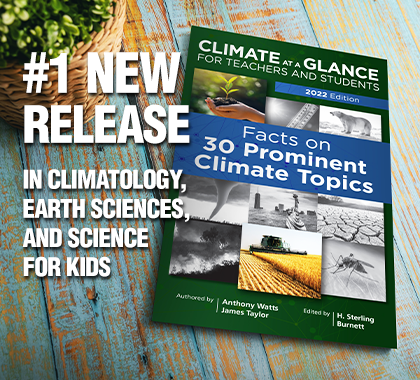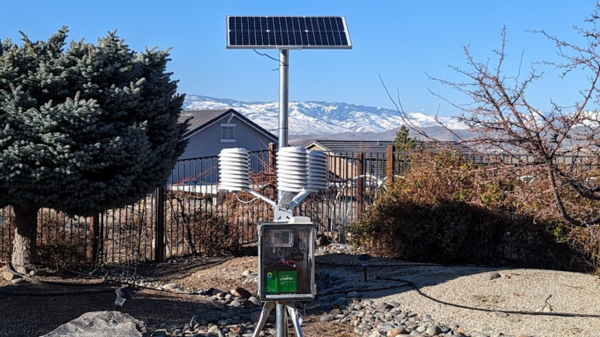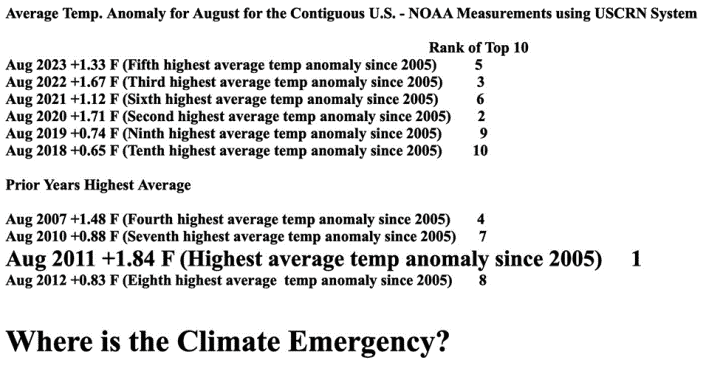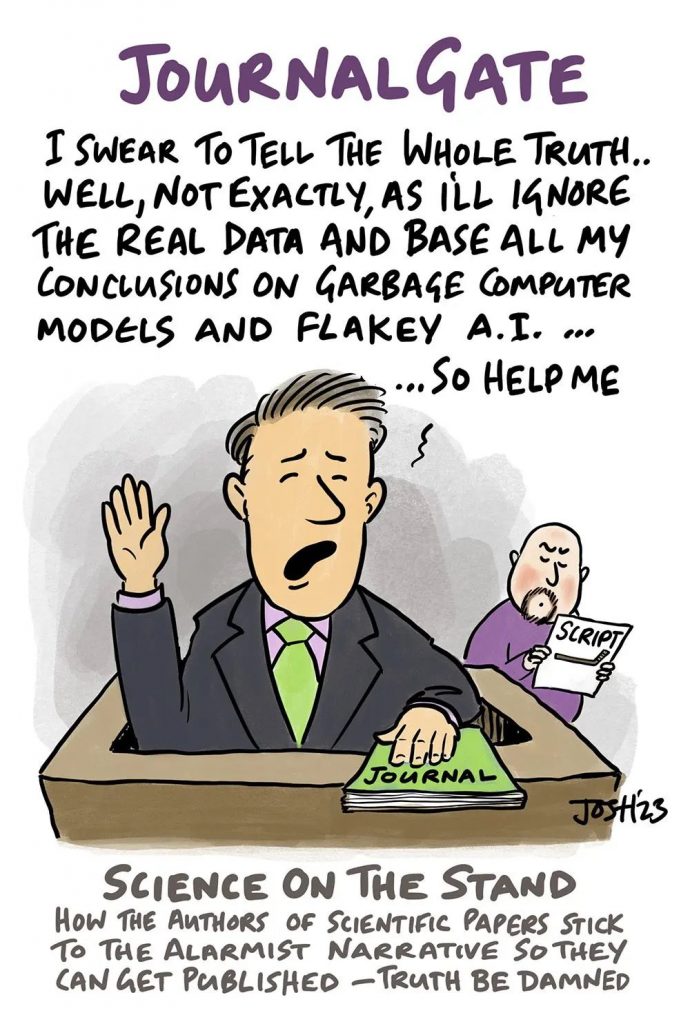YOU SHOULD SUBSCRIBE TO CLIMATE CHANGE WEEKLY.
IN THIS ISSUE:
- Climate Alarm Is a ‘One-Sided Religious Story,” Not Science
- Podcast of the Week: The Failure of Peer Review in Climate Science
- August Temperature Anomaly Undermines Emergency Claims
- Video of the Week: When Davos Controls the Farms
- Climate Comedy
- Recommended Sites
Miss Anything at Heartland’s Climate Conference? No Problem.

Climate Alarm Is a ‘One-Sided Religious Story,” Not Science

Bullying and censorship are rife in scientific and public discussions of climate change. What is driving the present round of climate change and whether it will bring catastrophe or benefits should be open to debate and discovery both within the discipline of science and in the wider realm of public debate and policy. That is not the case at present. Whether in climate science or the wider public discourse, corrupt undue influence, bullying, and censorship have become the norm, undermining the quest for truth and sound policy.
Recently, a peer-reviewed study cited in numerous other studies was retracted a year and a half after it was published by the European Physical Journal Plus, under pressure from prominent climate researchers and the climate-alarmed media.
In the paper, “A critical assessment of extreme events trends in times of global warming,” Italian researchers in the fields of physics and meteorology reviewed the literature and examined the data for extreme weather events. The data showed no increasing trends for heat waves, tropical cyclones, extreme precipitation events, tornadoes, droughts, floods, and crop failures, which they dutifully and accurately reported in their paper.
Based on their review of the data, they wrote, “In conclusion on the basis of observational data, the climate crisis that, according to many sources, we are experiencing today, is not evident yet.”
This finding should not be controversial: it corresponds with what can be found buried deep within the most recent report of the United Nations’ Intergovernmental Panel on Climate Change. It is hardly outside the mainstream.
Following the science, however, is evidently not enough to insulate one’s work from retribution when the science conflicts with the “consensus” narrative that a climate crisis is in the offing.
After an Australian politician cited this research in a statement, the self-appointed standard bearers for climate science orthodoxy in the media and the academy took umbrage. They applied pressure to the journal to withdraw the paper, which, in a craven act of intellectual cowardice, it did. The paper was retracted not because it included any identifiable errors or any faulty data—in other words, not because it was fraudulent or false—but because, as the journal’s editors wrote, “Concerns were raised regarding the selection of the data, the analysis and the resulting conclusions of the article.”
This is not an isolated incident. The 2009 Climategate scandal revealed researchers cherry-picked data, manipulated peer review to keep papers out of journals, and attempted to have journal editors fired for publishing studies that raised questions about the climate crisis narrative. In his excellent Quadrant article on “How Science is Done These Days,” Tony Thomas quoted a July 2004 email sent by Dr Phil Jones to Michael “Hockey Stick” Mann, which read as follows:
“I can’t see either of these papers being in the next IPCC report. Kevin [Trenberth, a colleague] and I will keep them out somehow—even if we have to redefine what the peer-review literature is!”
Roger Pielke Jr, Ph.D., said the “abuse of the peer review process documented here is remarkable and stands as a warning that climate science is as deeply politicized as ever with scientists willing to exert influence on the publication process both out in the open and behind the scenes,” in describing the European Physical Journal Plus’s action. Commenting on the retraction in a tweet, prominent climatologist Judith Curry, Ph.D., said, “Reprehensible behavior by journal editors in retracting a widely read climate paper (80,000 downloads) over politically inconvenient conclusions. Journal editors asked me to adjudicate, and my findings were in favor of the author.”
Further reinforcing the conclusion the purported climate consensus is based on enforced conformity, not grounded in the scientific method and critical thinking, was the aftermath of the publication of a paper in Nature Communications, “Climate warming increases extreme daily wildfire growth risk in California.” The study concluded “anthropogenic warming has enhanced the aggregate expected frequency of extreme daily wildfire growth by 25% (5-95 range of 14-36%), on average, relative to preindustrial conditions.”
This claim was widely parroted by the mainstream media, such as the Los Angeles Times (LAT), which wrote, “Climate change has ratcheted up the risk of explosive wildfire growth in California by 25%.”
The LAT ignored important caveats in the paper. The finding wasn’t based on real-world data but on computer models. And because the models were inadequate to the task, they were enhanced by the use of artificial intelligence to hindcast estimates of climate change’s influence on wildfire behavior. The authors admit the computer models were inadequate, writing, “Some portion of the change in wildfire behavior is attributable to anthropogenic climate warming, but formally quantifying this contribution is difficult because of numerous confounding factors and because wildfires are below the grid scale of global climate models.”
As to those cofounding factors, the lead author of the study, Patrick Brown, who holds positions at The Breakthrough Institute, San Jose State University, and Johns Hopkins University, wrote in The Free Press shortly after the article’s publication that the authors “Left Out the Full Truth to Get [their] Climate Change Paper Published,” as the headline stated.
In the Free Press piece, Brown admitted he had self-censored the journal article:
I just got published in Nature because I stuck to a narrative I knew the editors would like. That’s not the way science should work.
The paper I just published—“Climate warming increases extreme daily wildfire growth risk in California”—focuses exclusively on how climate change has affected extreme wildfire behavior. I knew not to try to quantify key aspects other than climate change in my research because it would dilute the story that prestigious journals like Nature and its rival, Science, want to tell.
This matters because it is critically important for scientists to be published in high-profile journals; in many ways, they are the gatekeepers for career success in academia. And the editors of these journals have made it abundantly clear, both by what they publish and what they reject, that they want climate papers that support certain preapproved narratives—even when those narratives come at the expense of broader knowledge for society.
To put it bluntly, climate science has become less about understanding the complexities of the world and more about serving as a kind of Cassandra, urgently warning the public about the dangers of climate change.
Among the factors Brown admits he and his colleagues left out of their analysis were “poor forest management and the increasing number of people who start wildfires either accidentally or purposely. (A startling fact: over 80 percent of wildfires in the US are ignited by humans.)” The study also ignored other factors such as people and communities increasingly building homes, businesses, and entire towns in areas historically prone to seasonal natural wildfires. As Climate Realism has demonstrated repeatedly, these factors “can be just as or more important” than climate change, as Brown admits in his article.
These instances of scientific bullying and failure to tell the truth, the whole truth, and nothing but the truth strongly suggest that to the extent there is a consensus that humans are causing catastrophic climate change, as determined by counting journal entries supporting or disputing the claim, it is ginned up through the manipulation of the peer-review process.
If the story stopped there, it would be bad enough, but it doesn’t. In Canada, it seems, professionals in other fields of science aren’t allowed to express their opinions on climate change in public without having their credentials threatened and being forced to pay for their own reeducation—straight out of Orwell’s 1984 and its “Ministry of Truth.”
The case of psychologist and popular social commentator Jordan Peterson is instructive.
Peterson appeared on the popular Joe Rogan podcast, and part of the discussion turned to climate change and the impact of repeated climate scares on young people’s mental health and the rise of protest actions. Peterson called the alarmism permeating the popular discussion of climate change a “one-sided religious story” and “an ideology.”
Peterson agreed when Rogan noted there has never been a time when the Earth’s climate was stable, and he pointed out carbon dioxide may not be a problem. Even if rising CO2 levels are a problem, Peterson and Rogan agreed, civilization has adapted to and flourished despite crises in the past, and there is no reason to think we can’t continue to do so in the future.
For voicing his opinion in this very public forum, the College of Psychologists of Ontario (CPO) reprimanded Peterson, ordering him “to undergo re-education at the hands of a social media ‘expert’ for an indefinite period and at his own expense,” as noted in the Financial Post. The CPO has threatened to pull Peterson’s license to practice if he refuses to comply.
Mind you, the CPO is ordering this not based on any claims Peterson made as a psychologist or actions as a clinician hampering the well-being of his patients, but for stating his private opinions in a nonprofessional role based on his own assessment of the available facts in the climate debate. Concerning the dangers this case raises, Université du Québec à Montréal economics professor emeritus Steve Amber writes in the Financial Post,
Science requires open debate. It does not advance by consensus or political pressure.
Many observers have pointed out the chilling effect of the CPO ruling: members of any professional association (engineers, lawyers, accountants, medical professionals, teachers, etc.) will now hesitate to speak up on matters of public interest, even if these have nothing whatsoever to do with their professional activities.
In the United States, at least until COVID-19 hit our shores, such an action by a professional body would have been considered a clear violation of a person’s right to free speech protected by the First Amendment to the Constitution. Who knows whether it would be seen so now in the post-virus world we find ourselves in. Fortunately for the climate scolds in Canada, though not for Peterson, Canadians have no such constitutional protections for their private speech. In Canada, the government locks up ministers for preaching what they believe the Bible has to say if it offends a protected class of people, so what chance does Peterson have? Peterson offended the consensus, after all.
In the perverted realm of climate change, the truth is no defense against opprobrium, censorship, and sanction.
Sources: The Epoch Times; YouTube; Financial Post; Climate Realism
Get your Copy at Amazon TODAY!

Podcast of the Week
This episode of Climate Change Roundtable titled, “The Failure of Peer Review: Climate is Beholden to Bullying and Bad Decisions” delves into the shadowy and competitive world of climate journal publications. Heartland’s Anthony Watts, Sterling Burnett, and Linnea Lueken, delve into the not-so-scientific ways that science gets published (or retracted) that have come to light in the past two weeks.
They discuss Dr. Robert T. Brown’s stunning admission that he held back certain data and analysis in order to ensure his climate paper got published by Nature. They also look at the “climategate gang” and how they have bullied another journal to retract a paper they don’t like, which had already passed peer review. Now, new evidence has emerged of even more bullying.
Subscribe to the Environment & Climate News podcast on Apple Podcasts, iHeart, Spotify or wherever you get your podcasts. And be sure to leave a positive review!
August Temperature Anomaly Undermines Emergency Claims

Meteorologist and Heartland Institute Senior Fellow Anthony Watts and others have long pointed out the U.S. surface temperature record derived from data gathered by the Cooperative Observer Network (COOP), administered by NOAA’s National Weather Service (NWS) division, is corrupted by localized effects of urbanization. The Urban Heat Island (UHI) effect produces heat bias because of the close proximity of weather stations to asphalt, machinery, and other heat-producing, heat-trapping, or heat-accentuating objects. A recent survey conducted by Watts with the help of volunteers found 96 percent of the stations sampled were corrupted, producing biased temperature records.
The stations operate in locations that violate NOAA’s own published standards for quality measurements, strongly undermining the legitimacy of the official long-term climate warming trends reported for the United States.
As Watts points out, there is another option: the U.S. Climate Reference Network (USCRN).
The USCRN is made up of triple-redundant, state-of-the-art, ultrareliable weather stations located at pristine locations—places that exceed NOAA’s standards for ensuring the stations are not now nor ever likely to be affected by the UHI. This network of climate monitoring stations measures temperature, precipitation, wind speed, soil conditions, and more at sites across the conterminous United States and Alaska and Hawaii.
The USCRN was first established by NOAA in 2005 to provide an unbiased temperature record and correct the biased temperature record measured by the COOP system.
Sadly, when reporting temperature trends in the United States, especially in reports hyping the dangers of climate change, government agencies and scientists funded by government grants and research funding cite the corrupted COOP network temperature data, not the numbers from the USCRN. Perhaps that’s because the USCRN’s recorded temperature change trend is half or less that recorded by the COOP network.
The difference between the temperature data recorded by the two networks has become especially important this summer, which many commentators have referred to as the hottest on record. The July and August temperature anomaly has been above average, sparking claims of this being the “hottest summer in history.” Some commentators displayed a little more caution by modifying the claim to say, “hottest summer in recorded history.”
Those claims are based on data from the woefully compromised COOP network. As Larry Hamlin notes in a post on Watts Up With That, the USCRN data tells a much different story. Far from being the hottest August on record, August 2023 was only the fifth-hottest August since 2005.
Hamlin displayed the top 10 August temperature anomalies over the past 18 years, in the table below:

Where’s the climate emergency, indeed? Not only was this August not the hottest in history, or even in recorded history, it was not even the hottest in the last 18 years.
Source: Watts Up With That; The Heartland Institute
Heartland’s Must-read Climate Sites
Video of the Week
The Heartland Institute’s Donald Kendal dives into a report by the World Economic Forum, analyzing the ways financial firms can pressure the agricultural industry into going “green.” Kendal adds context into the failures of various “green” agriculture initiatives with real-world results, from The Netherlands to Sri Lanka.






























